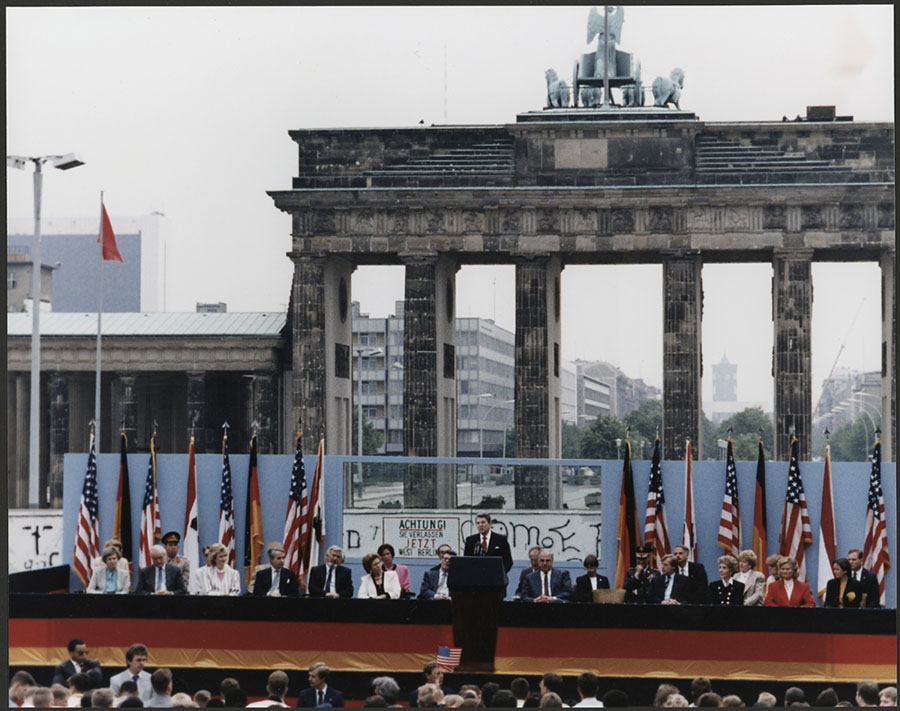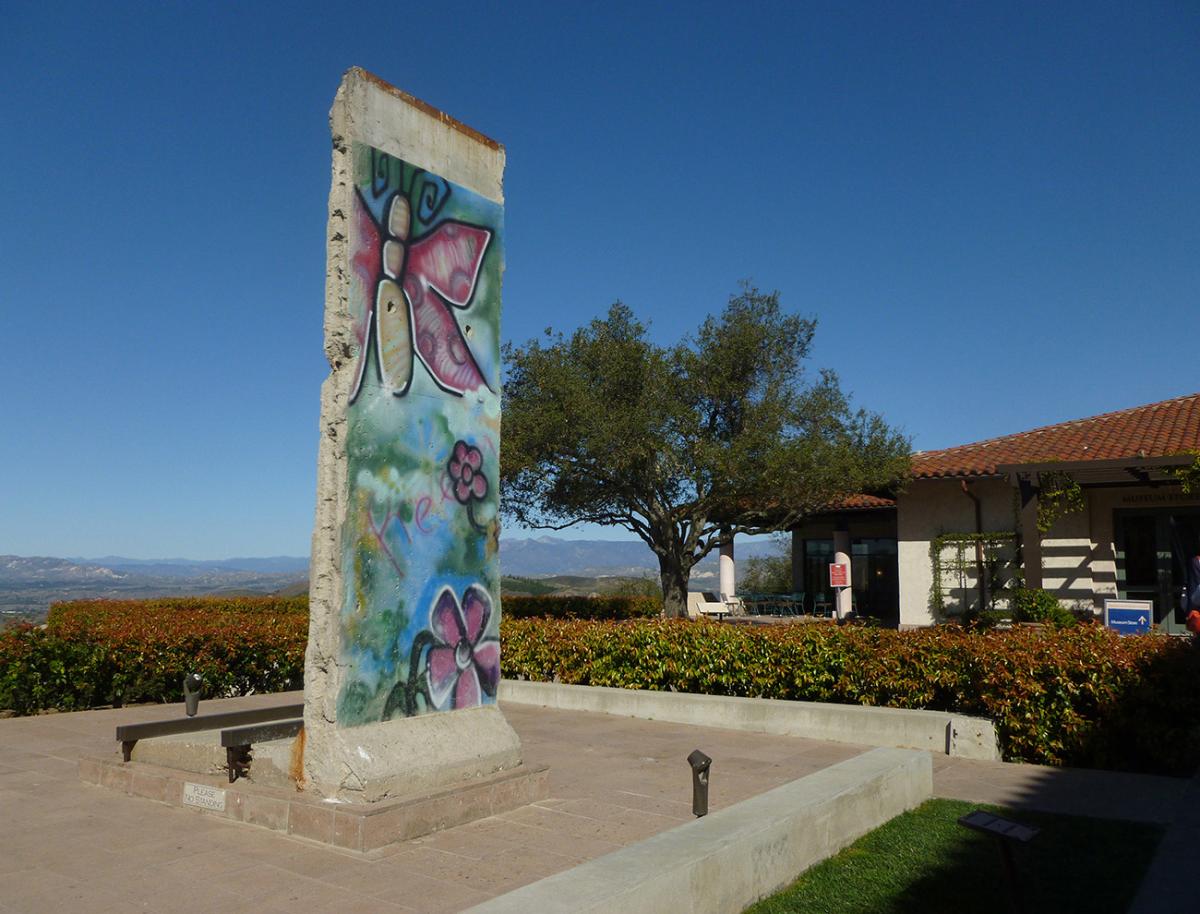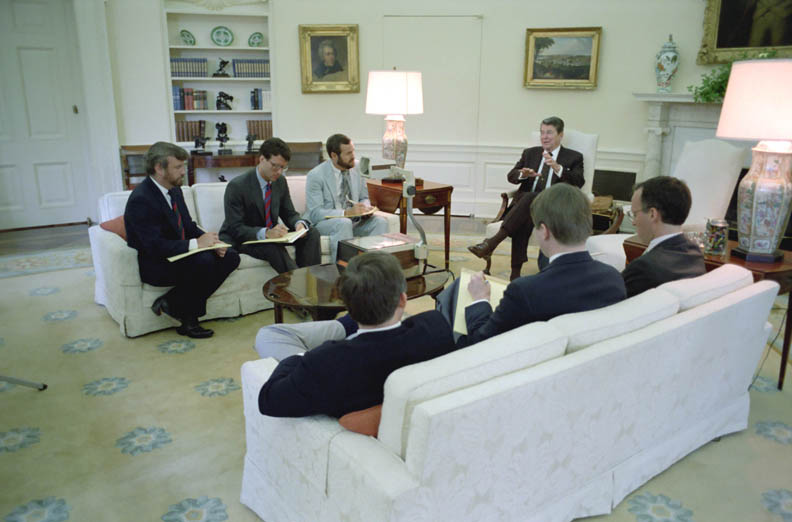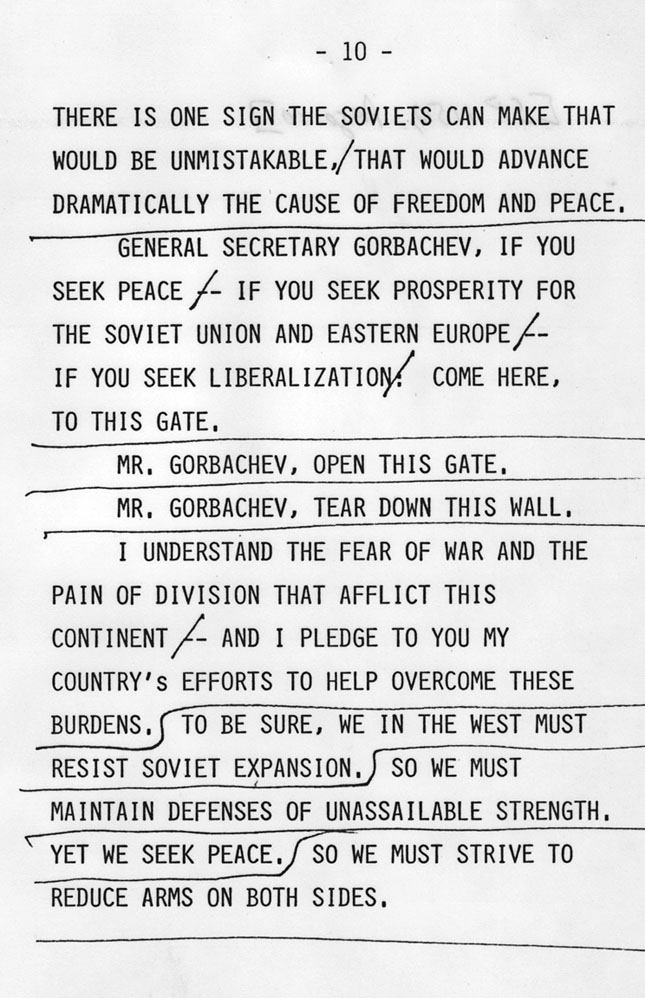
“Tear Down This Wall”
How Top Advisers Opposed Reagan's Challenge to Gorbachev—But Lost
Summer 2007, Vol. 39, No. 2
By Peter Robinson
© 2007 by Peter Robinson
Behind me stands a wall that encircles the free sectors of this city, part of a vast system of barriers that divides the entire continent of Europe. . . . Standing before the Brandenburg Gate, every man is a German, separated from his fellow men. Every man is a Berliner, forced to look upon a scar. . . . As long as this gate is closed, as long as this scar of a wall is permitted to stand, it is not the German question alone that remains open, but the question of freedom for all mankind. . . .
General Secretary Gorbachev, if you seek peace, if you seek prosperity for the Soviet Union and Eastern Europe, if you seek liberalization, come here to this gate.
Mr. Gorbachev, open this gate!
Mr. Gorbachev, tear down this wall!
In April 1987, when I was assigned to write the speech, the celebrations for the 750th anniversary of the founding of Berlin were already under way. Queen Elizabeth had already visited the city. Mikhail Gorbachev was due in a matter of days.
Although the President hadn't been planning to visit Berlin himself, he was going to be in Europe in early June, first visiting Rome, then spending several days in Venice for an economic summit. At the request of the West German government, his schedule was adjusted to permit him to stop in Berlin for a few hours on his way back to the United States from Italy.
I was told only that the President would be speaking at the Berlin Wall, that he was likely to draw an audience of about 10,000, and that, given the setting, he probably ought to talk about foreign policy.
Later that month I spent a day and a half in Berlin with the White House advance team—the logistical experts, Secret Service agents, and press officials who went to the site of every presidential visit to make arrangements. All that I had to do in Berlin was find material. When I met the ranking American diplomat in Berlin, I assumed he would give me some.
A stocky man with thick glasses, the diplomat projected an anxious, distracted air throughout our conversation, as if the very prospect of a visit from Ronald Reagan made him nervous. The diplomat gave me quite specific instructions. Almost all of it was in the negative. He was full of ideas about what the President shouldn't say. The most left-leaning of all West Germans, the diplomat informed me, West Berliners were intellectually and politically sophisticated. The President would therefore have to watch himself. No chest-thumping. No Soviet-bashing. And no inflammatory statements about the Berlin Wall. West Berliners, the diplomat explained, had long ago gotten used to the structure that encircled them.
After I left the diplomat, several members of the advance team and I were given a flight over the city in a U.S. Army helicopter. Although all that remains of the wall these days are paving stones that show where it stood, in 1987 the structure dominated Berlin. Erected in 1961 to stanch the flow of East Germans seeking to escape the Communist system by fleeing to West Berlin, the wall, a dozen feet tall, completely encircled West Berlin. From the air, the wall seemed to separate two different modes of existence.
On one side of the wall lay movement, color, modern architecture, crowded sidewalks, traffic. On the other lay a kind of void. Buildings still exhibited pockmarks from shelling during the war. Cars appeared few and decrepit, pedestrians badly dressed. When he hovered over Spandau Prison, the rambling brick structure in which Rudolf Hess was still being detained, soldiers at East German guard posts beyond the prison stared up at us through binoculars, rifles over their shoulders. The wall itself, which from West Berlin had seemed a simple concrete structure, was revealed from the air as an intricate complex, the East Berlin side lined with guard posts, dog runs, and row upon row of barbed wire. The pilot drew our attention to pits of raked gravel. If an East German guard ever let anybody slip past him to escape to West Berlin, the pilot told us, the guard would find himself forced to explain the footprints to his commanding officer.
That evening, I broke away from the advance team to join a dozen Berliners for dinner. Our hosts were Dieter and Ingeborg Elz, who had retired to Berlin after Dieter completed his career at the World Bank in Washington, D.C. Although we had never met, we had friends in common, and the Elzes had offered to put on this dinner party to give me a feel for their city. They had invited Berliners of different walks of life and political outlooks—businessmen, academics, students, homemakers.
We chatted for a while about the weather, German wine, and the cost of housing in Berlin. Then I related what the diplomat told me, explaining that after my flight over the city that afternoon I found it difficult to believe. "Is it true?" I asked. "Have you gotten used to the wall?"
The Elzes and their guests glanced at each other uneasily. I thought I had proven myself just the sort of brash, tactless American the diplomat was afraid the President might seem. Then one man raised an arm and pointed. "My sister lives twenty miles in that direction," he said. "I haven't seen her in more than two decades. Do you think I can get used to that?" Another man spoke. Each morning on his way to work, he explained, he walked past a guard tower. Each morning, a soldier gazed down at him through binoculars. "That soldier and I speak the same language. We share the same history. But one of us is a zookeeper and the other is an animal, and I am never certain which is which."
Our hostess broke in. A gracious woman, she had suddenly grown angry. Her face was red. She made a fist with one hand and pounded it into the palm of the other. "If this man Gorbachev is serious with his talk of glasnost and perestroika," she said, "he can prove it. He can get rid of this wall."
Back at the White House I told Tony Dolan, then director of presidential speechwriting, that I intended to adapt Ingeborg Elz's comment, making a call to tear down the Berlin Wall the central passage in the speech. Tony took me across the street from the Old Executive Office Building to the West Wing to sell the idea to the director of communications, Tom Griscom. "The two of you thought you'd have to work real hard to keep me from saying no," Griscom now says. "But when you told me about the trip, particularly this point of learning from some Germans just how much they hated the wall, I thought to myself, 'You know, calling for the wall to be torn down—it might just work.'"
When I sat down to write, I'd like to be able to say, I found myself so inspired that the words simply came to me. It didn't happen that way. Mr. Gorbachev, tear down this wall. I couldn't even get that right. In one draft I wrote, "Herr Gorbachev, bring down this wall," using "Herr" because I somehow thought that would please the President's German audience and "bring" because it was the only verb that came to mind. In the next draft I swapped "bring" for "take," writing, "Herr Gorbachev, take down this wall," as if that were some sort of improvement. By the end of the week I'd produced nothing but a first draft even I considered banal. I can still hear the clomp-clomp-clomp of Tony Dolan's cowboy boots as he walked down the hallway from his office to mine to toss that draft onto my desk.
"It's no good," Tony said.
"What's wrong with it?" I replied.
"I just told you. It's no good."
The following week I produced an acceptable draft. It needed work—the section on arms reductions, for instance, still had to be fleshed out—but it set out the main elements of the address, including the challenge to tear down the wall. On Friday, May 15, the speeches for the President's trip to Rome, Venice, and Berlin, including my draft, were forwarded to the President, and on Monday, May 18, the speechwriters joined him in the Oval Office. My speech was the last we discussed. Tom Griscom asked the President for his comments on my draft. The President replied simply that he liked it.
"Mr. President," I said, "I learned on the advance trip that your speech will be heard not only in West Berlin but throughout East Germany." Depending on weather conditions, I explained, radios would be able to pick up the speech as far east as Moscow itself. "Is there anything you'd like to say to people on the other side of the Berlin Wall?"
The President cocked his head and thought. "Well," he replied, "there's that passage about tearing down the wall. That wall has to come down. That's what I'd like to say to them."
I spent a couple of days attempting to improve the speech. I suppose I should admit that at one point I actually took "Mr. Gorbachev, tear down this wall" out, replacing it with the challenge, in German, to open the Brandenburg Gate, "Herr Gorbachev, machen Sie dieses Tor auf."
"What did you do that for?" Tony asked.
"You mean you don't get it?" I replied. "Since the audience will be German, the President should deliver his big line in German."
"Peter," Tony said, shaking his head, "when you're writing for the President of the United States, give him his big line in English." Tony put "Mr. Gorbachev, tear down this wall" right back in.
With three weeks to go before it was delivered, the speech was circulated to the State Department and the National Security Council. Both attempted to squelch it. The assistant secretary of state for Eastern European affairs challenged the speech by telephone. A senior member of the National Security Council staff protested the speech in memoranda. The ranking American diplomat in Berlin objected to the speech by cable. The draft was naïve. It would raise false hopes. It was clumsy. It was needlessly provocative. State and the NSC submitted their own alternate drafts—my journal records that there were no fewer than seven—including one written by the diplomat in Berlin. In each, the call to tear down the wall was missing.
Now in principle, State and the NSC had no objection to a call for the destruction of the wall. The draft the diplomat in Berlin submitted, for example, contained the line, "One day, this ugly wall will disappear." If the diplomat's line was acceptable, I wondered at first, what was wrong with mine? Then I looked at the diplomat's line once again. "One day?" One day the lion would lie down with the lamb, too, but you wouldn't want to hold your breath. "This ugly wall will disappear?" What did that mean? That the wall would just get up and slink off of its own accord? The wall would disappear only when the Soviets knocked it down or let somebody else knock it down for them, but "this ugly wall will disappear" ignored the question of human agency altogether. What State and the NSC were saying, in effect, was that the President could go ahead and issue a call for the destruction of the wall—but only if he employed language so vague and euphemistic that everybody could see right away he didn't mean it.
The week the President left for Europe, Tom Griscom began summoning me to his office each time State or the NSC submitted a new objection. Each time, Griscom had me tell him why I believed State and the NSC were wrong and the speech, as I'd written it, was right. When I reached Griscom's office on one occasion, I found Colin Powell, then deputy national security adviser, waiting for me. I was a 30-year-old who had never held a full-time job outside speechwriting. Powell was a decorated general. After listening to Powell recite all the arguments against the speech in his accustomed forceful manner, however, I heard myself reciting all the arguments in favor of the speech in an equally forceful manner. I could scarcely believe my own tone of voice. Powell looked a little taken aback himself.
A few days before the President was to leave for Europe, Tom Griscom received a call from the chief of staff, Howard Baker, asking Griscom to step down the hall to his office. "I walked in and it was Senator Baker [Baker had served in the Senate before becoming chief of staff] and the secretary of state—just the two of them." Secretary of State George Shultz now objected to the speech. "He said, 'I really think that line about tearing down the wall is going to be an affront to Mr. Gorbachev,'" Griscom recalls. "I told him the speech would put a marker out there. 'Mr. Secretary,' I said, 'The President has commented on this particular line and he's comfortable with it. And I can promise you that this line will reverberate.' The secretary of state clearly was not happy, but he accepted it. I think that closed the subject."
It didn't.
When the traveling party reached Italy (I remained in Washington), the secretary of state objected to the speech once again, this time to deputy chief of staff Kenneth Duberstein. "Shultz thought the line was too tough on Gorbachev," Duberstein says. On June 5, Duberstein sat the President down in the garden of the estate in which he was staying, briefed him on the objections to the speech, then handed him a copy of the speech, asking him to reread the central passage.
Reagan asked Duberstein's advice. Duberstein replied that he thought the line about tearing down the wall sounded good. "But I told him, 'You're President, so you get to decide.' And then," Duberstein recalls, "he got that wonderful, knowing smile on his face, and he said, 'Let's leave it in.'"
The day the President arrived in Berlin, State and NSC submitted yet another alternate draft. "They were still at it on the very morning of the speech," says Tony Dolan. "I'll never forget it." Yet in the limousine on the way to the Berlin Wall, the President told Duberstein he was determined to deliver the controversial line. Reagan smiled. "The boys at State are going to kill me," he said, "but it's the right thing to do."
Not long ago, Otto Bammel, a retired diplomat, told me what he had witnessed in November 1989, some two-and-a-half years after President Reagan delivered the Brandenburg Gate address. Representing the government of West Germany, Bammel was living with his wife and two sons, both of whom were in their early twenties, in an East Berlin home just a few hundred yards from the wall. During the evening of November 9, as the East German state council met in emergency session—a few days earlier there had been peaceful but massive demonstrations throughout East Berlin—Bammel and his oldest son, Karsten, watched television as an East German official held a press conference.
"It was so boring," Bammel said, "that I finally couldn't take any more. So I said, 'Karsten, you listen to the rest. I'm going into the kitchen for something to eat.' Ten minutes later Karsten came to me and said, 'The official just announced everyone can go through the wall! It's a decision made by the state council!' I didn't believe this could happen. It was an unbelievable event." Certain that his son had somehow misunderstood, Bammel took his wife to the home of a neighbor, where they were expected for dinner.
"When we got back at midnight we saw that our boys were still out," Bammel continued. "And we were surprised that there were so many cars driving within the city, but where the traffic goes and why it was, we did not know. We went to bed. When we got up at seven o'clock the next morning, we saw a piece of paper on our kitchen table from our youngest boy, Jens, telling us, 'I crossed the wall. I jumped over the wall at the Brandenburg Gate with my friends. I took my East Berlin friends with me.'
"I said to my wife, 'Something is wrong.' Without eating we took our bicycles and went to the border. And that was the first time we saw what happened in the night. There were people crossing the border on foot and in cars and on bicycles and motorbikes. It was just overwhelming. Nobody expected it. Nobody had the idea that it could happen. The joy about this event was just overwhelming all other thoughts. This was so joyful and so unbelievable."
There is a school of thought that Ronald Reagan only managed to look good because he had clever writers putting words in his mouth. But Jimmy Carter, Walter Mondale, Bob Dole, and Bill Clinton all had clever writers.
Why was there only one Great Communicator?
Because Ronald Reagan's writers were never attempting to fabricate an image, just to produce work that measured up to the standard Reagan himself had already established. His policies were plain. He had been articulating them for decades—until he became President he wrote most of his material himself.
When I heard Frau Elz say that Gorbachev should get rid of the wall, I knew instantly that the President would have responded to her remark. And when the State Department and National Security Council tried to block my draft by submitting alternate drafts, they weakened their own case. Their speeches were drab. They were bureaucratic. They lacked conviction. The people who wrote them had not stolen, as I had, from Frau Elz—and from Ronald Reagan.
Peter Robinson, an author and former White House speechwriter, is a Fellow at the Hoover Institution at Stanford University. In 1983 Robinson joined President Ronald Reagan's staff, serving almost five years as speechwriter and special assistant to the President, an experience he recounts in his 2003 book, How Ronald Reagan Changed My Life. Robinson provided the chief executive with more than 300 speeches, including the 1987 Berlin Wall address.



